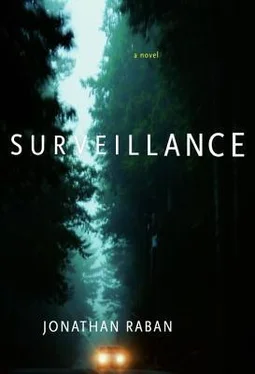“Tonight, can we get pizza?”
ENTERING THE APARTMENT, Lucy was immediately aware of something odd and wrong, though what that something was she couldn’t place. Then she saw that her wilted lilies in the vase on the table had been replaced by fresh tulips. That would be the ever-thoughtful Tad, who had a key to 701 as she had a key to 704. But it wasn’t just the tulips. She scanned the living room and fixed on the bookshelves: her small library was all out of order, with many of the books stuffed in backward, spine first. It looked like some ham-fisted ape had been at work, wrecking her careful alphabetizing, with Kathy Acker where Virginia Woolf should be. Outraged and bewildered by this weird invasion — violation — of her territory, she cast helplessly around for an explanation until she remembered the landlord’s promise to attach her shelves to the wall.
She pulled out an armful of books and saw the new screws, neatly countersunk into the wood of the Pepsi crates. How could anyone go to such trouble, yet show such blatant contempt for her books? It would take hours and hours to put them back in order.
He had no right…
Yet anger with the landlord contended with a wary lightening of the heart, for if he was really bent on eviction, why on earth would he bother to anchor his tenant’s possessions so securely to the building? Each crate was now attached to the wall by four big silver screws. Stolen night by night from outside the grocery store in Missoula, lightly sandpapered, and brushed with four coats of Varathane, the Pepsi crates had traveled with her since her sophomore year of college.
“Rabbit, what are four eighteens?”
“Seventy-two,” Alida called back from her room.
How long would that have taken him? More time than it was worth, surely. One screw per crate, two at most, would have done the job, but he’d created a structure of such rigidity and permanence that it would take the total collapse of the Acropolis to shake these shelves from the wall. If that was any indication of how her tenancy stood in his eyes, she ought to be delighted with his work, despite the shambles he’d made of her books.
“Are you busy, Rabbit? I’d love for you to come and help me in here if you can.”
“Oh my God, what happened ?” Alida said when she saw the bookshelves.
“Our helpful landlord.”
“Oh, right — I remember, like earthquake retrofitting. He said he’d do it over the weekend.”
“I’d forgotten all about it.”
Admiring the exposed screw-heads, Alida said, “Cool.”
“You know what? I don’t think we’re going to have to live in the Spider. I think it’s a good sign. But he’s made one hell of a mess.”
Together they set to work, emptying the shelves and putting books back in order. The landlord’s indecent haste was everywhere in view: paperbacks with their covers creased back, torn dust jackets, here and there a broken spine. Filing Marge Piercy’s Braided Lives alongside Eleanor Pierce’s All You Need to Know About Living Abroad, Alida complained of the promiscuous mingling of fiction and nonfiction.
“You ought to use the Dewey decimal system.”
“What? All those numbers…943-point-blah-blah-blah? You have to be kidding.”
“It’s really logical. The thing about Dewey is like there’s a special space for every book that’s ever going to be written, and for subjects that nobody’s even dreamed up yet. It’s über. The Dewey system reaches to infinity.”
“Where did you learn all this, Rabbit?”
“Mrs. Markowitz, she’s the school librarian. What you have to remember about the Dewey decimal system is it always goes from the general to the particular.”
“Which is the exact opposite of how my mind works.”
“My favorites are the 500s and the 900s. Like 943 whatever? I know that’s history — the history of somewhere. Europe, maybe — I dunno.”
“The things you teach me.”
“It’s never too late to learn.” Alida’s voice was pure schoolmarm as, standing on a stool, she slotted Dr. Atkins’ Diet Revolution next to the now doubly unfortunate Ms. Acker.
Every book was back in place, and Alida on the phone to the pizza joint, when Tad made his one-two-three rap on the door. “I saw the car,” he said. “Don’t tell me — you had the weekend from hell.”
“Actually, no. We—”
“Tad!” Then, into the phone, “Wait!” then to Tad, “Goat Cheese Primo?” then back to the phone, “Can you make that a three-way large — with Original, Brooklyn Bridge, and Goat Cheese Primo?” In the last few weeks Alida had taken command of all telephone orders: she now dispatched them with the alarming authority of a career waitress hollering to a short-order cook.
“Oh, dear,” Tad said to Lucy. “I’d so hoped we could share. My weekend has been such a succession of humiliations, I can’t tell you. I’ve been spending all today in the time-out corner.”
“Why the gay voice?” Alida said as she went to hug him.
Tad laughed. “Because I’m being a self-hating old fag is why. How was it, Ali? You have an okay time?”
“It was good.”
“Alida went kayaking,” Lucy said.
“You fall in? The only time I went kayaking, I spent the entire time falling in.”
“No, but I got really freaked out by the sharks.”
“Oh yeah, those famous Puget Sound sharks.”
“No, really. This shark — it was this big.” She stretched her arms out as far as they’d go. “It went right under my kayak. Augie saw another. He said there were usually hundreds of them. They’re called dogfish, but they’re really sharks, and cousins of the Great White. They hunt in packs, like wild dogs, and they can give you a real bad bite.”
Tad flashed Lucy a What the fuck? look, then said, “How far out was this?”
“Oh, not far.”
“And he told you there were hundreds to a pack, and they’d attack you?”
“He said if they felt threatened.”
To Lucy, Tad said, “You weren’t there?”
“No, I was back at the house, but—”
“He was messing with your head, Ali.”
Lucy heard this as the exposed tip of an iceberg of anger, but luckily Alida didn’t seem to catch it. She said, “The one I saw, it was like this brown color, and it was so close. I mean, I could have like touched it with my paddle.”
“Dogfish,” Tad said, “are totally harmless. They’d no more attack you than a guppy or a goldfish would.”
“But Augie’s like this big expert on nature.”
Tad let the subject drop, but the sharks cast a long inhibiting shadow over dinner.
Alida excused herself early from the table, which was unusual for evenings when Tad was there, asking if she could watch The Incredibles on the DVD player.
“Sometimes I hate journalism,” Lucy said. “Especially profiles. The more friendly you get with a subject, the more you feel like a spook.”
“We’re all spooks now. Look at the way people Google prospective dates. Everybody’s trying to spy on everybody else. At least you know you’re a spook, which is something. Most people are in denial.” He stared gloomily at his untouched glass of white wine. “You ever played with Google Earth? I zoomed in on the Acropolis and you could see everything — the chimneys, the water tank, the skylight in the hall, the place where the tar paper’s ripped on the roof, both our cars in the street, the guys in the alley, the manhole covers…everything. What this means? You’re thinking of dating a guy, you enter his address on Google Earth, and you can check out his house, how he keeps his yard, whether he should take out a loan to redo his roof. You can practically see into his bedroom and go through his underwear drawer. Everybody does it. And if we can do that, just think what the boys in Yakima can do.”
Читать дальше












